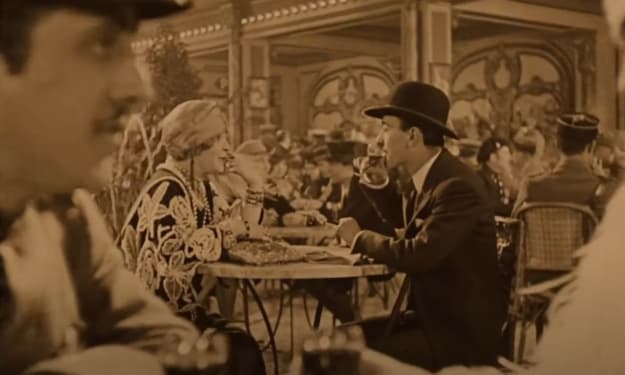Master and Commander: A Hidden Anti-Authoritarian Gem
The 'exacting, detail-oriented epic tale of fidelity to Empire & service' has gained a cult following and renewed attention. But few are aware of the more subtle messages in the film.

Amidst the roaring tides of social media trends and popular media discussion, a surprising resurgence in sea shanties (of all things) has brought attention to Master and Commander: The Far Side of the World. The 2003 historical fiction film, based on the Patrick O'Brian novels of the same name, follows Captain Jack Aubrey as he leads the HMS Surprise with 28 guns and 197 souls off the coasts of South America. Their mission: find the French Privateer Acheron and sink, burn, or take her a prize. Sadly, not all the attention has been positive.
On Twitter, that gaping abyss of screaming matches, hot takes, and anonymous eggs, Russel Crowe the star of the film defended the movie against a user who suggested the film couldn't hold one's attention. Crowe argues that the movie was for adults and kids today have no focus at all.
As one of those young 'kids', I was... In complete agreement with everything Russel Crowe said. Master and Commander is a masterpiece not just as an exciting historical fiction film but as a subtle critique of the very system the film portrays. The film seems to excel in every goal it sets itself. Delivering not just on the spectacle of naval warfare, impressive filmmaking, but also the psychological and sociological toll.
While I could carry on about the unique and clever ways the film establishes and pays off its premises, (from the accomplished musician Jack finding sheet music in his final fight, to the masterful give and take between our protagonists and antagonists, etc.) the amazingly accurate and worn costuming, the impeccable soundtrack, how delightfully British the film is, and more. For now, I will leave the compliments of the filmmaking to Crowe and the superb historical analysis to History Buffs.
I will focus on how the film criticizes the conceptions of our heroes' belief system, and the authoritarian system therein, without cheaply dehumanizing any particular character.
War movies mostly exist on a spectrum with two ends. One being the propaganda-esque military piece, the other being the anti-war picture. The first is relatively obvious, movies like Michael Bay's Pearl Harbor, Tony Scott's Top Gun, and, arguably as with many Superman works, Zack Snyder's Man of Steel. The opposite comes in various forms, whether it's portraying warmongers as dangerously incompetent, as seen in Stanley Kubrick's Dr. Strangelove, showing the violence of war and deconstructing the 'heroism' of soldiers like in Francis Ford Coppola's Apocalypse Now, or sympathizing with the demonized 'other' like Hayao Miyazaki's Nausicaä of the Valley of the Wind. But at their core, they challenge the underpinnings and actions of war which governments and military leaders almost universally justify. While it's tempting to presume the anti-war flick is inherently superior and more nuanced than the supportive ones, there can be a lot of nuance in films that ultimately reassert many conceptions of warfare. For instance, Saving Private Ryan begins with a portrayal of the D-Day invasion so visceral and realistic many veterans felt their old wounds reopening. But while that dirty, destructive, and terrible battlefield does strike sadness and allow the audience to recognize war is not a wholely triumphant endeavor, the film's overall tone and message still endorse soldiers and war as a noble goal.
That's not an inaccurate or anti-progressive take so to speak. It is actually far more accurate to the almost contradictory attitudes we have to carry with us on a daily basis. The recognition that war can be wasteful, destructive for generations, and always involves copious death on both sides. There's also the struggle of whether we can stop supporting a destructive system, when it tries to serve a good cause, such as intervening in humanitarian crises. And you'd be hard-pressed to find a single person who didn't respect and support the troops, it's almost impossible to take two steps into the anti-war sphere and not hear large discussions on veteran's issues and affairs.
However, the above view can sometimes lead to an overly simplistic dichotomy. Where the soldier is always good and virtuous, and it is the state's fault for any impropriety in regards to warfare. This disregards the soldier's role in upholding that system. And this is where Master and Commander shows its anti-authoritarian colors.
The primary vehicle for this message is the conflict and friendship between Captain Jack and the ship's doctor Stephen Maturin.
Captain Jack is a man of service, of experience, he cares deeply about his men, the crown, and his ship. Jack has been with the Surprise practically his whole life and by extension the rules of the service. We see this in his actions and philosophy about leadership. He is insistent that 'men must be governed' he believes there must be a strict dichotomy between sailor and shipman to preserve order and peace on the ship and puts country and mission above all other flights of fancy. He's very much a man of tradition and rule.
Dr. Stephen Maturin is more of an intellectual, a man of science. He seems out of place in meetings with the captain and midshipmen, he has a much more regular and personal interaction with the crew, given he treats their many wounds which gives him a glimpse into their lives. While he respects his country and service, he also has a deep love of nature and feels that the navy can be downright backward.
These two world views collide when Jack determines he must whip a lower crew member for disrespecting his superior Hollom (whom we will return to) in accordance with tradition to maintain order. Jack states it makes him 'so very low' when the doctor speaks of the service as tyrannical and tries to justify it with an appeal to nature, noting there are hierarchies in nature just as Maturin would say. Though Maturin is cut off his key point remains, 'there is no disdain in nature.' This is a direct criticism of how the service operates, noting that while a hierarchy may be necessary the cruel punishments have no decency or necessity. Rather than portraying the service as independent of the unjust governments that rule it, he directly compares the Captain to such tyrants as Nero, and the Empire's chief enemy, Napoleon Bonaparte. The cinematography in this scene also supports this analysis. The doctor is filmed with a steady camera that holds its position steady on Maturin, implying he is the steady voice of reason. For Jack, the handheld camera moves ever so slightly following his body movements, showing how self-centered and desperate his opinions really are.
This isn't a cheap one-off either, the movie consistently reinforces that the HMS Surprise and the Acheron are two sides of the same coin. For one, Maturin points out that they are struggling to capture the Acheron because the captain 'fights like you, Jack' this is also shown in the action scenes where what was established as an exceedingly clever tactic, is also used by the French ship, the crew 'plays dead' when the heroes board, just as the Surprise was disguised as a merchant's vessel. Implying that our heroes are very similar to the shadowy enemy, subtly undercutting the righteousness of the service we are obliged to sympathize with.
This isn't to say the film demonizes Jack. We are consistently shown his care for his crew and friends, and thoughtfulness about his actions. His continuous efforts to comfort Blakeney through his loss of limb, his rewarding of the boy with a small command, as well as gifting him a book on the exploits of Horatio Nelson. The grief he feels when he must sever the mast of a ship to save his crew, thus directly contributing to one man's death. When Maturin is shot, his request to stop and study at the Galapagos, which was previously denied, is granted so he may heal. It's also worth noting that this compassion helps Jack learn how to surprise the Acheron, and claim the ship.
For his part, Maturin though sure in his belief of science being more righteous than service leaves behind his many specimens in order to give the Surprise the military advantage she needs. Putting the service above self.
This provides criticism of those in the service, while not forgetting the soldiers' admirable fidelity and their humanity. Showing the failings of authoritarianism, the service and ship benefit from Jack's kindness, but are hurt psychologically and physically by the penal command.
When it comes to the psychological harm of authoritarianism, I would be remiss if I didn't speak on Hollom's story.
Of all the men, Hollom may be the least equipped for naval life. He's generally incompetent with his duties and has never been promoted despite being thirty. He comes across as generally shy and coddled from his well-off background. There is a pivotal scene (shown above) where the mates are singing shanties Hollom tries to join in. His well-trained voice is heard above the rest and the crew looks at him with suspicion. Afterward, they turn away and sing a new song, rejecting his company. Hollom committed a minor transgression of the hierarchy, the crew and the leaders are not meant to socialize, they are not intended to be friendly, one governs the other is governed, such is the order of things. So when Hollom sings with the crew, or he tries to be friendly with them, he not only draws ire from the captain for not maintaining dominance but also paranoia and disdain from the crew.
As time goes on the crew's suspicion of Hollom grows, Biblical conspiracy festers that his presence is causing the drought, disobedience of his orders, followed by Jack's punishment only ostracizes Hollom more. Hollom eventually commits suicide from the stress and loneliness. The rain that comes afterward gives the crew justification for their superstition. Demonstrating the soldier can be just as cruel and unforgiving as the tyrant within the arena of war.
Authoritarianism in Master and Commander isn't a far-off concept dealt by government actors, it isn't a veil that hangs over our united crew, it is a psychological weapon born from fury and just cause that destroys friendships, wears the bond between men, and ends lives.
It can be easy to miss the connection between these examples with just one watch. But after several viewings (in my case dozens) they shine through, how the empire's and Navy's authoritarianism holds progress back, (insight into the Acheron's build comes from the lower decks, and the tactics come from naturalist study) how it harms those within the system, and how even the least of members contribute to that harm.
But the HMS Surprise is not an unfeeling machine, the authoritarianism causes harm, yes, but there is a reason, they can't afford a mutiny, for the survival of the ship and mission. The leaders aren't soulless monsters who uphold the system out of spite, but men who have history and interests, compassion, and ambition. Even good men operate in harmful systems.
This isn't the striking image of Lord Nelson, who the film references and compliments his exploits, and who is generally regarded as a hero within British culture, nor is it the unfeeling Stalin sending his men to death. It is the dirty, deadly, and also human military. At once harboring an unspoken fear and an ever-present camaraderie.
In short, Master and Commander shows the tactics and cost of war, the music and the misery, its tragedy and its triumph.
About the Creator
Lucy Richardson
I'm a new writer who enjoys fiction writing, personal narratives, and occasionally political deep dives. Help support my work and remember, you can't be neutral on a moving train.
https://twitter.com/penname_42






Comments
There are no comments for this story
Be the first to respond and start the conversation.